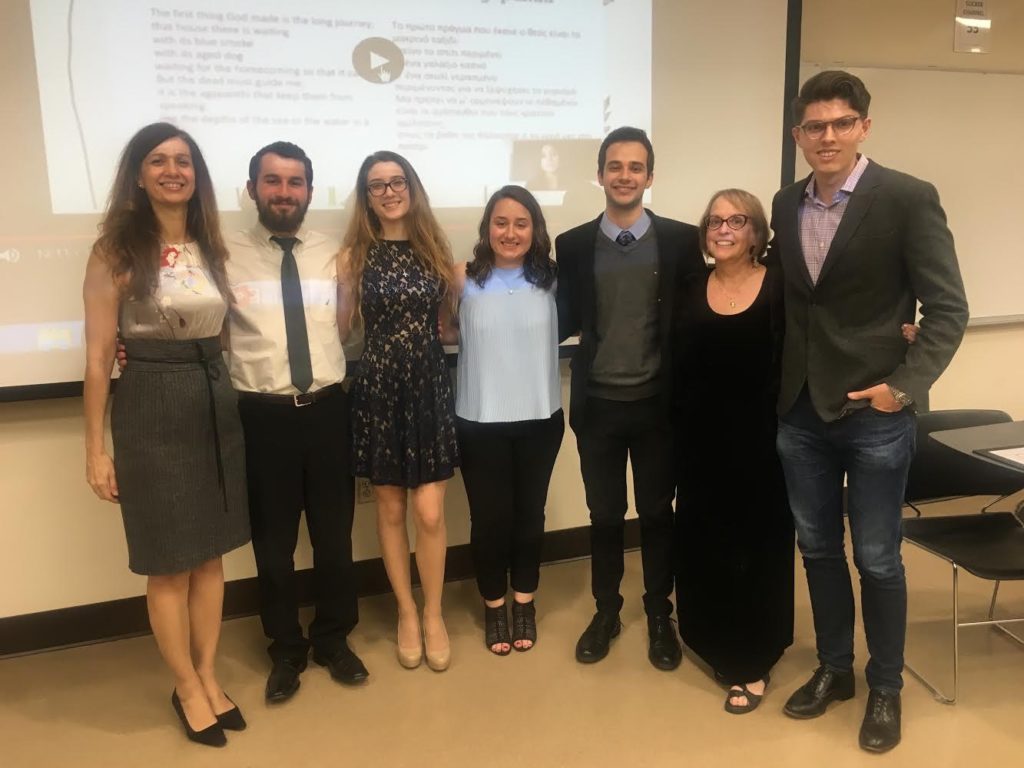
By Stamatina Mylonas
Born in Athens, Greece, Dr. Polyvia Parara has a passion for understanding her roots. She began her career as an undergraduate at the National and Kapodistrian University School of Philosophy in her home town of Athens and received her degree in History. Later, Dr. Parara received her Masters and Ph.D. from the University of Paris X-Nanterre focusing on Classics and Classical Languages, Literatures, and Linguistics. Dr. Parara has now become an educator herself, teaching at prominent U.S. institutions like Georgetown University in Washington D.C., and at the University of Maryland College Park. Her areas of expertise are Classics and Modern Greek language, politics, and identity.
GCT had the pleasure of meeting Dr. Parara to discuss the notable research she has done during her career and also what it truly means to be Greek, giving good insight and advice for young Greek professionals trying to excel in their career.
Her research was fascinating, as it gives understanding into how we think, feel, and relate to our Hellenism. For those of not living in Greece, they still, feel deeply connected to it and seek to find ways to express that. If you want to understand this connection more, keep reading for this thought-provoking research.

Did you always have an interest in pursuing a career in the subjects of Ancient and Modern Greek language?
I always believed deeply in the value of the Greek language Ancient and Modern. The Greek language among other unique features has the following: it identifies the signified (meaning) with the signifier (the word). For instance, the word "democracy" - both as signified and signifier- explains the assembly rules of the citizenry.
The conscious use of this language and therefore its understanding does not leave space for misunderstanding of the concept of "democracy", or much worse its distortion. Having said that, the literature written in this language is unique and revealing in analyzing the nature of the human being and its end. These texts are always modern and Greeks politics was part of their existence as human beings. The revisiting of the notion of politics is vital for us today and the Ancient Greeks are the source of inspiration and knowledge on this matter.
Throughout your career, how has your view on these subjects evolved, or perhaps stayed the same?
My view on these subjects evolved in terms that I could see the thread in the political thinking of many other authors from Homer and so on. I realised that the Ancient Greek authors speak to us directly to mediate on our political challenges. My interest now is to show how Ancient Greek thought can be a tool to face the challenges of the modern world. Topics such as political participation and engagement to politics, lawfulness and justice, freedom and autonomy, democracy and civic responsibility are found at the core of Ancient Greek thought. In addition to these topics, the questions of virtue and happiness at a personal level and the pursuit of happiness at the societal level need to be revisited by studying the primary sources on these values.

What have been the biggest challenges during your career and how did you overcome them?
In practical terms, being a full-time mother and a full-time scholar, was my biggest challenge. I overcome it by scheduling effectively and working constructively all day long. Another practical challenge is that I publish scholarly work in three languages: English, French, and Greek. In intellectual terms, is how to convey my aforementioned argument (questions 1 and 2) in the most convincing and engaging way.
How do you believe a deeper knowledge of these subjects, will change how Greeks and the Greek Diaspora view themselves and their culture, and how they move forward?
If the Greeks and the Greeks of the Diaspora acquire a deep and conscious knowledge of the cultural capital of Hellenism, they can become pioneering leaders and transform our world for the better. I believe they need to invest more in the value of their identity. And this identity is national and universal as well, and this is well captured by Isagoras: "Greek is who partakes to the Greek paideia (Hellenism )".
Could you give us a little more insight into your current research?
My current research focuses on two projects:
The first is a unique and unpublished volume entitled “Classical Bouquet” that I brought into the light and published in 2017. It was hidden for one hundred and sixty years at the rare collections library of the Smithsonian Institution. It is a big luxurious volume created by the learned Cretan woman Elisavet Contaxaki, to be presented on behalf of the Greek Kingdom to France’s First Universal Exhibition at Paris in 1855. This volume of one hundred and fourteen pages consists of painted illustrations of the principal monuments and places in the Greek Kingdom, to which are added to a few pages from her native isle of Crete. These illustrations are explained by quotations from Ancient Greek authors, historians, philosophers and poets in the original language and include translations in French as well as literary excerpts in English, French and Italian. The objective of the book is to address the value of the Greek World and its universal impact.
I am also writing a book on the Modernity of Ancient Greeks with the content I described above.

Along with the insight into the truly interesting research, she is doing, Dr. Polyvia leaves us with valuable advice. She said she believes, “young Greek professionals should dedicate themselves to a career that is fulfilling to them and helps them develop their personalities holistically. I would advise them not to prioritise their materialistic prosperity in detriment of their intellectual and emotional completion; this is the true meaning of being 'Greek.'"
The ultimate goal is then to find your passions and pursue them wholeheartedly. Dr. Parara’s passion for Ancient and Modern Greek studies has grown into her becoming a respected educator and a pioneering author.
